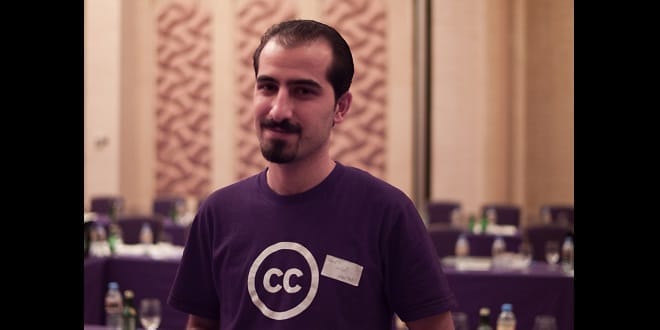Open source developer and advocate for an open Internet, Bassel Khartabil, has been imprisoned by the Syrian government since 2012. However, his situation has recently gotten even worse. On October 3, he was moved out of the prison he was being held in, and the government refuses to disclose his new location. Khartabil's wife, Noura Ghazi, was contacted in November by insiders in the Assad regime who told her that Khartabil has been sentenced to death.
Khartabil founded Aiki Lab in 2010, and used it as a base to promote open source software and a free and open Internet. Khartabil is credited with helping artists and writers in the Arab World to freely share their works online. He contributed to the English and Arab version of Wikipedia, and helped with editing and translating articles. He wrote the code to make the open source Firefox browser work in Arabic. He won the 2013 Index on Censorship Digital Freedom Award for using technology to promote an open and free internet. While imprisoned, he contributed input to the New Palmyra Project, which is working to create a digital reconstruction of the Palmyra ruins which have been destroyed by ISIS.
In March 2012, he was detained and subject to interrogation and torture by Syrian security forces. He was brought before a military court in December 2012, and charged with harming state security. He was then moved to a lower security prison where he was able to receive visits from his wife. He has stayed in that prison until being taken to an undisclosed location in October of this year. In April of this year, the United Nations Working Group on Arbitrary Detention called for his immediate release, after declaring his arrest and imprisonment to be arbitrary.
Its unclear what exactly the Syrian government want him for, since he has never called for the overthrow of the government, or in any way incited violence or rebellion. However it may be that Khartabil's work to facilitate the spread of information online is seen as a threat by the Assad regime, which seeks to control the flow of information in Syria. Lawrence Lessig, the Harvard professor who co-founded Creative Commons stated, "He was a leader in a movement which is about connecting people globally. I imagine inside Syria that made him something of a threat." Danny O’Brien of the Electronic Frontier Foundation, argues that there is a new pattern of authoritarian governments going after technologists the way they have historically gone after journalists.
There is a petition to have Khartabil released, which currently has over 40,000 signatures. While it may seem like a long shot for an online petition to convince the Assad regime to release Khartabil, Mohamad Najem, a friend of Khartabil who started the petition, thinks there is a real chance of it working. When Khartabil was originally detained he was held by security forces for months and wasn't allowed to talk to anyone, but he was later moved to a civilian prison and was then allowed to write letters and receive visitors. It is believed this change was brought about by international pressure. Those who support the petition hope that further pressure can have him released, or at the very least save his life is he is sentenced to death.
Can Khartabil be saved by international pressure? Leave your comments below.







